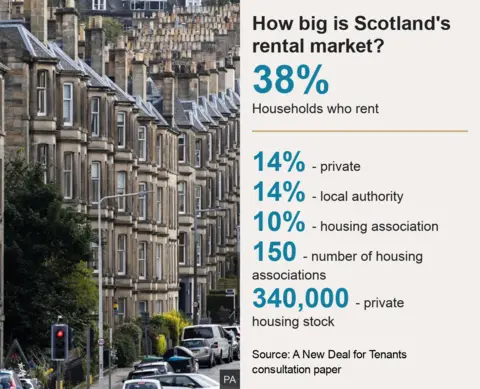Rent freeze plan to tackle cost-of-living crisis in Scotland
Nicola Sturgeon has announced a rent freeze for public and private rented properties as part of efforts to help people struggling with rising bills.
The first minister said the cost-of-living crisis was a "humanitarian emergency" which could cost lives.
Her government is to table emergency legislation banning evictions during winter and freezing rents until spring.
There are also plans to freeze rail fares and to boost the Scottish Child Payment to £25 per week from November.
Ms Sturgeon has also written to new Prime Minister Liz Truss, asking her to convene a four-nation meeting of political leaders to focus on helping households.
The plans were part of the first minister's annual Programme for Government speech, which comes at the start of each new year at Holyrood.
She said the legislative programme was deliberately focused on the cost-of-living crisis, which she said "poses a danger not just to livelihoods but to lives".
Ms Sturgeon called for action from UK ministers "on a scale similar to the Covid response", but said her government would also take further steps to "strengthen the emergency safety net for those struggling to pay bills".

This includes an increase in the Scottish Child Payment - a weekly payment to families who are in receipt of certain benefits - to £25 per week from 15 November. The scheme is also to be expanded to eligible under-16s, meaning more than 400,000 could benefit.
ScotRail fares are to be frozen until at least March 2023, with the government having taken the rail operator into public ownership earlier in the year.
And Ms Sturgeon confirmed that emergency legislation would be tabled at Holyrood to protect tenants in private and socially rented homes.
This will include a moratorium on evictions during winter as well as a rent freeze, to run from today until at least the end of March next year.


Nicola Sturgeon's plans to freeze rents, ban evictions and raise the child payment to £25 a week will make the headlines today.
But these announcements were prefaced with a very stark warning from the first minister - that the Scottish government is getting short of cash.
That rising inflation has reduced their spending power and that larger-than-expected pay deals for public sector workers and other cost-of-living help will also limit what they can spend elsewhere.
In short, "hard choices" lie ahead and the Scottish government won't be able to do everything it would like.
That may not only mean rejecting new demands but potentially delaying or dropping some existing commitments.
The first minister did not give details. It seems that is being delegated to her deputy, John Swinney, who is due to make a separate financial statement tomorrow.

The Scottish Association of Landlords accused the the government of "attacking landlords for political reasons".
Chief executive John Blackwood said the proposals "will only further reduce the supply of housing, putting more people at risk. This is not a solution, it will only cause more hardship."
He also said he had been "inundated" by landlords saying they would be removing their vacant properties from the rental market.
In her speech the first minister warned that her government faces "hard choices" in how these policies are paid for, with an emergency budget review being carried out.
She said it would mean "stopping some things we planned to do, to fund what is essential to support people through this crisis".
The other proposals announced as part of the Programme for Government included:
- extending free school meals to include pupils in primary 6 and 7
- abolishing the not proven verdict as part of a Criminal Justice Bill
- establishing a new public body responsible for qualifications through an Education Reform Bill
- the creation of a National Care Service
- a Local Visitor Levy Bill to give councils the power to apply a levy on overnight stays
- government support for a bill to protect safe access for women to healthcare facilities that provide abortion services
Ms Sturgeon also said she still aims to hold an independence referendum in October 2023, arguing that Holyrood lacks the powers "we desperately need to respond to a crisis like this".
But opposition parties hit out at this, saying it was a waste of time and money.
Scottish Conservative leader Douglas Ross said the programme "falls woefully short".
He called for the Scottish and UK governments to "tackle the cost of living crisis jointly together" and said Ms Truss would roll out plans in the coming days to alleviate the pressure on household budgets.
Mr Ross also said an independence referendum was "unacceptable at a time when people are struggling - the wrong priority at the worst possible time".
Scottish Labour leader Anas Sarwar said the government "needs to go further and go faster to avert this crisis".
He said: "Whether you voted yes or no, whether you voted leave or remain, your bills are going up right now - you need urgent action right now.
"You need a UK government to step in right now to impose an energy price freeze and a windfall tax, and you need an emergency cost of living act in Scotland right now to put more money in people's pockets."
Scottish Lib Dem leader Alex Cole-Hamilton said the speech was "thin gruel" for anxious Scots, and that the government lacked the "humility, creativity and ambition necessary to face the problems".
The Scottish Greens - who are in government with the SNP - welcomed the announcements. MSP Ariane Burgess said the rent freeze would "provide vital stability and support for tenants across Scotland at a time when many are suffering".